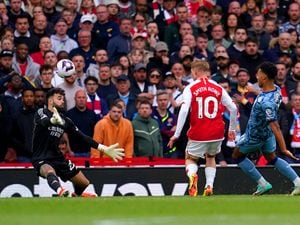A new world for Wolves' new arrivals
Their players drive around in Fiat Puntos and earn around £135 a week.
Their players drive around in Fiat Puntos and earn around £135 a week.
But one day they hope to be driving in the fast lane of the Premier League.
A community-led project between Wolves and India I-League club Jagatjit Cotton and Textile (JCT FC) has the ultimate aim of producing a player good enough to join the Molineux academy.
Yesterday, as part of a three-year partnership between the two clubs, Wolves took delivery of five young players from JCT and their coach, Parminder Singh, for a week to develop their skills.
Originally the brainchild of Punjab Wolves - the 500-strong multi-cultural group of gold and black devotees - the first seeds of the link-up between the clubs was sown in May 2008 when Wolves chief executive Jez Moxey and assistant manager Terry Connor, as well as Wolverhampton MP Pat McFadden, travelled to JCT's new complex in Hoshiarpur.
Punjab Wolves was started through the help of brothers Jas and Raj Bains, Wolverhampton-born lifelong Wolves fans whose parents came from that region.
And they could not be more pleased to see the relationship they helped foster blossom between the clubs down to grassroots level.
This week will see the Wolves academy coaches pass on their knowledge to Singh, who will return to the Punjab at the end of the week with his players ready to implement the new techniques and advice.
But any fans thinking Wolves are about to unearth the next Kevin Doyle in Delhi should think again.
Any prospect of finding and then developing talent to a standard good enough even to academy standard is still some years away.
Such are the differences between the game here and in India at every level that it will be a long time before we are likely to see a player follow in the footsteps of Baichung Bhutia, India's most famous player who played 37 games for Bury a decade ago.
Singh explained: "The ultimate dream is to get a player over here but the game needs to develop because football is not the main sport – cricket is so big there.
Wolves academy boss Kevin Thelwell said: "First and foremost, it's a lead on the community-based thing we had previously in terms of the visits to India with Jez and Terry.
"I want to build on that link, but in due course, the main aim is to develop an Asian player to play for Wolves' first team.
"It's very much about the players getting an experience of what the football is like over here and for them to be able to take that, as well as the features and characteristics of our players, back home.
"But it's also heavily based on coach education and we've been talking to Parminder about the way in which we work with the players, not just in pre-season, but also during the season and how we fit our games into that structure.
"We've also been talking in terms about the way we play from a technical perspective. We're hoping we'll have a couple of Wolves coaches who will go out to India and support the link further in that respect in terms of coach education.
"It's a solid relationship on all fronts."
India's cricket heroes are feted like our footballers over there and football is second best. Footballing-wise, the infrastructure is nowhere near as advanced as ours.
The pitches are good and JCT's new complex is revolutionary in that all 30 full-time players, along with the full-time backroom staff of a coach and two assistants plus physio, live there rent-free in comfortable surroundings.
These include a swimming pool and gym facilities in a development funded by multi-millionaire owner Samir Thapar, a cousin of India's 34th richest man, worth £1.19billion.
Thapar, who made his money in cotton, is a massive football fan and currently attending the World Cup, so certainly appears to have his heart in the right place.
Nevertheless, despite his efforts, the physical strength of the players and their diet is not as developed as in Britain.
Thelwell added: "I understand they will be competing against other sports which will make it extremely difficult for them.
"I also realise their facilities aren't as good as ours, but we want to concentrate on the education of the coaches so we work on what they do as opposed to where they play.
"It's going to be a difficult and it will take a bit of time, but I'm sure with the enthusiasm from them and us, we can make solid strides forward to make it a good situation for all.
"I've been pleasantly surprised by the standard of the players – they're at a good level.
"People have to understand that even in our younger players in the academy of 16-17-years-old, 60 per cent of them are internationals."
The warmer temperatures in India – their season is played from October to May when it is around 35 degrees C, while it never dips below 16 degrees C - mean a slower pace to their game too.
Thelwell said: "They play the game slightly differently over there, so for them to fit in to what we're doing is a huge accolade for them.
"Their game is probably a little bit slower, so them handling the ball under pressure is something they need to improve on.
"But if we're taking about what's happening on the grass, they're fairly good technically and they have a good tactical understanding.
"They probably need some development work on their physique, because our boys have a solid physical programme from 13 years of age.
"In time, if we can build the relationship and they can take back some of the work then they can develop."
Thelwell admits it is impossible to put a timescale on when a player good enough for Wolves will be produced.
He said: "It's difficult to say. I've never been to India but hopefully in October we can have a decent fact-finding opportunity and reviewing where they are in terms of development.
"Then we can look at plans to take that forwards."
By Tim Nash





